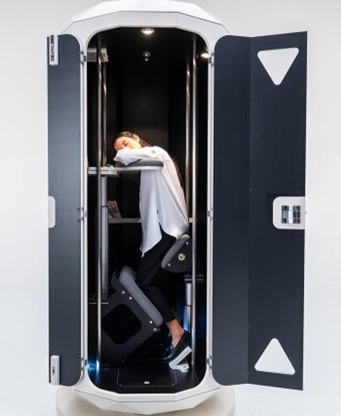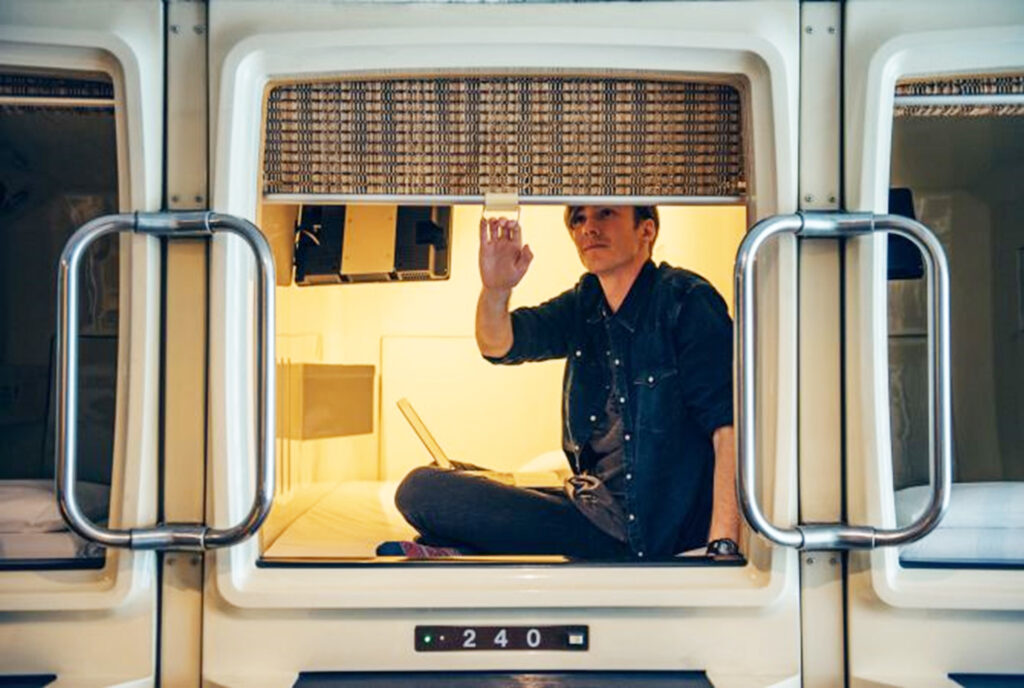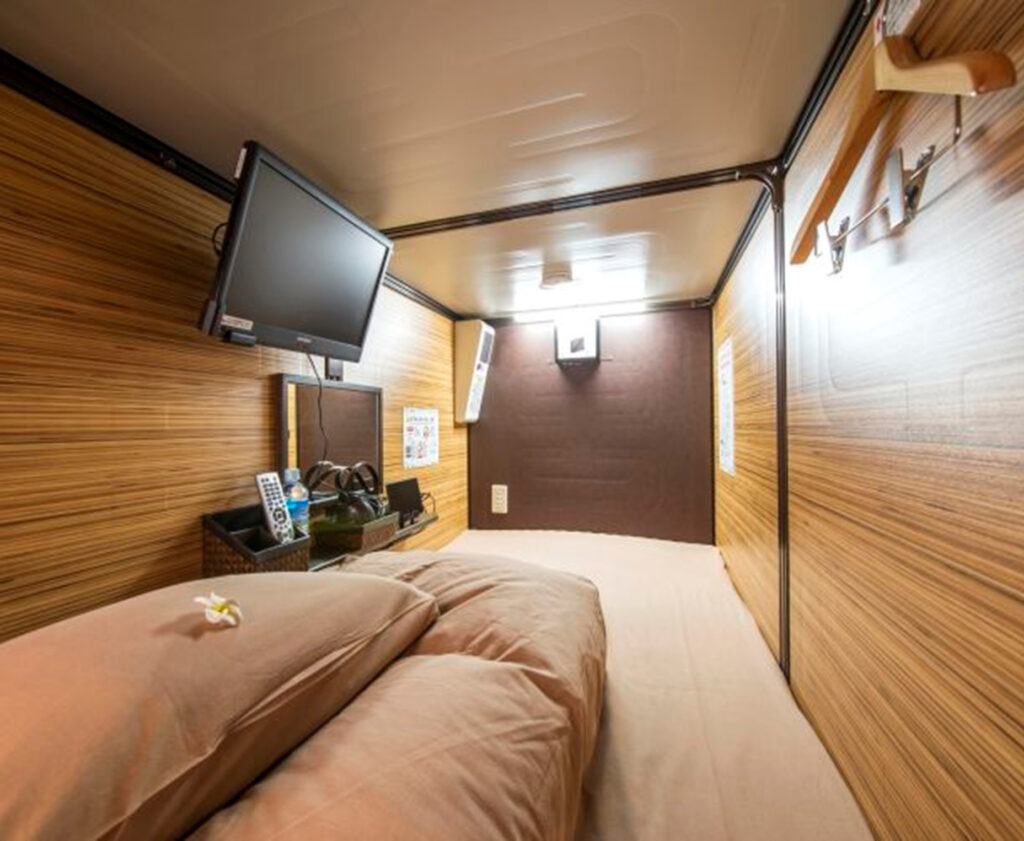Wanna sneak a nap?
Who hasn’t been tired at work and wanted to reap the mental and physical benefits of a quick nap? However, if you were to stretch out on the break room sofa, you’d likely disrupt the “feng shui” of the entire office. The folks in Japan have developed another fix for the busy, work driven crew. It’s called Giraffenap. Giraffenap is a specially designed capsule that allows sleepy workers to remain upright while catching a few Zs in the office. According to research, sleeping upright can allow you to enter a stage of sleep that provides a lot of the health benefits of napping without making you groggy upon awakening. The rub is that it’s really hard to sleep standing up, and that’s actually how the inventor of Griaffenap got the idea in the first place. While watching tired commuters on the busy trains of Japan, the inventor watched as knees buckled while people desperately clung to their straps and thought there had to be a better way. Giraffenap provides support to the upper body, buttocks, knees, and feet to let nappers feel secure and supported while they doze off
Giraffenap takes up about 16 square feet of floorspace and stands about 8 feet tall. It comes in two styles to fit differing aesthetic sensibilities. First, there’s the Spacia model that has a clean, futuristic profile, resembling the place where a Galactic Stormtrooper might sneak off to after realizing they’re too tired to shoot anything accurately. The nap capsule is also available in the more organic-looking Forest model, a perfect fit for soothing environments that benefit from the tranquil tones of wood, like spas or clinics.
How about Capsule hotels?
The Japanese are famous for shrinking everyday objects and making things simpler. Like Hotels. Why do you want to use a whole big room and a have a private bathroom when all you want to do is sleep? The Japanese solution is Capsule hotels. Yep, there are several versions of tubes you can slide into with your pillow and have a very economical night while traveling. A capsule hotel is made up of rows and rows of compact, self-contained “capsules.” These minimalist, bed-sized tubes give guests a private place to sleep, as well as access to communal facilities, such as toilets and showers. Ranging from sci-fi inspired futuristic pods to more elegant and upmarket sleeping cabins, a stay in one of Japan’s capsule hotels is an experience that’s not to be missed. The world’s first capsule hotel was geared more towards businessmen than tourists, these establishments offered an affordable place for salarymen to spend the night if they missed the last train home. These days, however, capsule hotels have become an attraction in themselves, and spending a night in one is on many foreign visitors’ to-do lists. This has resulted in the opening of a new wave of modern capsule hotels, and the increase in popularity has brought with it an increase in quality. Consequently, they are generally just as clean, safe and pleasant to stay in as any other hotel. You can find capsule hotels tend to be located near train stations, making them an extremely convenient accommodation option.
One of the major selling points of capsule hotels is the price tag. They’re usually cheaper than a regular hotel, and when you’re spending most of your time out and about you may well find you don’t miss the extra room all that much. Staying in one can also be a great way to meet people, as the shared nature of the facilities and closeness of the capsules pretty much guarantee you’ll bump into your fellow podmates. Of course there are some downsides to be aware of. The capsules can feel cramped, especially if you’re tall or prone to claustrophobia. And, as you’ll potentially be sharing with a roomful of strangers, you might find yourself stuck with some noisy neighbors or midnight snackers. One upside is the sheer novelty value. Staying in a capsule hotel is a travel experience all visitors to Japan should try at some point. While each establishment has different features, a standard pod will generally contain a mattress, pillow, shelf space, electrical outlets, Wi-Fi and perhaps a TV. A curtain or door will give you some privacy, but don’t expect it to be soundproof. Communal facilities likewise vary, but you can expect lavatories and showers. Amenities such as toothbrushes and even pajamas are often provided, too. Many hotels have a lounge area in which you can relax and socialize. You’ll be assigned a locker for your bag, but large suitcases will normally have to be left at reception.
Joking about Japan
What did Sushi A say to Sushi B?
Wasabi?
A frustrated Japanese father vented, “When I was a youngster, I was disciplined by being sent to my room without supper. But in my son’s room, he has his own color TV, telephone, computer, and CD player.” “So what do you do?” asked his friend. “I send him to MY room!” exclaimed the father.
Vandals have attacked the National Origami Museum in Tokyo.
We’ll keep you updated as the story unfolds…
I know we’re all supposed to be tolerant of people from other cultures, but is it too much to ask that Asian waiters learn that all Caucasians don’t look alike? My waiter just served my food to some other customer!
Oops, Wait. Never mind. That wasn’t my waiter.
July 15th Birthdays
1946 – Linda Ronstadt, 1989 – Aimee Carerro, 1977 – Diane Kruger, 1978 – Lana Parilla,
1976 – Gabriel Iglesias, 1987 – Mason Dye, 1967 – Adam Savage, 1961 – Forest Whittaker





